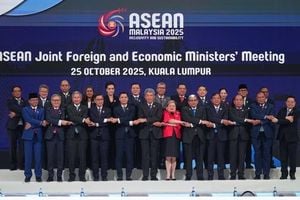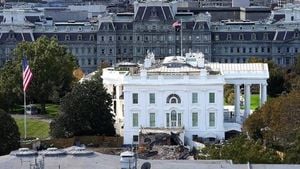In a move that has stirred both gratitude and controversy, the Pentagon confirmed on October 24, 2025, that it had accepted a $130 million donation from an anonymous ally of President Donald Trump to help pay U.S. military service members during the ongoing government shutdown. The decision, which marks an unprecedented departure from standard government funding procedures, has ignited a fierce debate in Washington and beyond over its legality, ethics, and implications for future military funding.
According to CNN, the Trump administration’s plan to funnel the $130 million private donation toward military payroll was disclosed by chief Pentagon spokesman Sean Parnell, who stated, “The donation was made on the condition that it be used to offset the cost of Service members’ salaries and benefits.” The Pentagon accepted the funds under its “general gift acceptance authority,” a policy that allows the Department of Defense to receive gifts under certain conditions. However, this policy is typically reserved for smaller, project-specific contributions, not for filling gaps in basic government obligations like military pay.
The government shutdown, now stretching into its 25th day and poised to become one of the longest in U.S. history, has left millions of federal employees facing missed paychecks and shuttered offices. The Trump administration previously shifted $8 billion from military research and development to cover payroll last week, and used $6.5 billion overall to make payroll during the shutdown, as reported by AP News. But with the next payday looming, uncertainty over how the administration would continue to ensure timely compensation for service members was mounting.
President Trump, speaking at a White House event on October 23, 2025, revealed the existence of the donation, saying, “That’s what I call a patriot.” He described the donor as “a friend of mine” who “loves the military and loves the country” and “doesn’t want the recognition.” Trump later elaborated that the donor is “a great gentleman,” “a patron,” and “a big supporter of mine,” adding that the man is a U.S. citizen. “He prefers that his name not be mentioned, which is pretty unusual in the world I come from,” Trump remarked, according to BBC News. “In the world of politics you want your name mentioned.”
Despite Trump’s assurances, both the Pentagon and the White House declined to disclose the donor’s identity or address questions about potential ties to foreign entities. The Pentagon referred inquiries back to the White House, while the Treasury Department did not immediately respond to requests for comment. This opacity has fueled speculation and concern among lawmakers and policy experts.
On Capitol Hill, the reaction was swift and divided. Congressional appropriators from both parties sought more information about the donation’s specifics, but as of October 24, 2025, had not received explanations from the administration. Some Democrats raised red flags about the legality of using private funds to pay military salaries, citing the Antideficiency Act, which strictly forbids federal agencies from spending funds beyond what Congress has appropriated and prohibits private donations from offsetting lapses in appropriations.
Bill Hoagland, a former Senate GOP budget aide and now a senior vice president at the Bipartisan Policy Center, told CNN, “The Antideficiency Act is explicit that private donations cannot be used to offset a lapse in appropriations. I think they could accept it but they could not use it for that purpose because the law is very clear.” Similarly, Romina Boccia, director of budget and entitlement policy at the Cato Institute, explained to Fox News Digital that “existing law only permits the military to accept private gifts for limited purposes, such as funding schools, libraries, or facilities, or helping troops injured or killed in the line of duty.” She added, “The only way to get around this restriction is if Congress decided to recategorize troop pay as mandatory or direct spending.”
Ethical concerns were also raised over the size and secrecy of the donation. Pentagon policy requires that gifts exceeding $10,000 be vetted by ethics officials to ensure there are no conflicts of interest or ongoing procurement actions involving the donor. Donations from non-U.S. citizens face even greater scrutiny. As BBC News highlighted, while the Pentagon does occasionally accept gifts, these are typically earmarked for specific projects, not for basic operational expenses.
Max Stier, president and CEO of the Partnership for Public Service, voiced his skepticism to AP News, saying, “That’s crazy. It’s treating the payment of our uniformed services as if someone’s picking up your bar tab.” He called for greater transparency and questioned the appropriateness of such a large, anonymous contribution. Delaware Senator Chris Coons, the top Democrat on the Senate’s defense appropriations subcommittee, warned, “Using anonymous donations to fund our military raises troubling questions of whether our own troops are at risk of literally being bought and paid for by foreign powers.”
On the other side of the aisle, some Republicans appeared less concerned about the donation’s origins, instead focusing on the political standoff that precipitated the crisis. The Trump administration and its allies have blamed Democrats for withholding pay from troops by refusing to agree to the administration’s budget demands, particularly over health care funding. “We are grateful for this donor’s assistance after Democrats opted to withhold pay from troops,” Pentagon spokesman Sean Parnell said in a statement, as reported by CNN and Fox News Digital.
Yet, as budget analyst Todd Harrison of the American Enterprise Institute explained to Politico, the $130 million, while substantial, is only a drop in the bucket compared to the billions required to cover military payroll. Covering pay for the first half of October alone cost about $6.5 billion, meaning the donation would cover roughly one-third of a single day’s pay for the nation’s 1.32 million service members. For many, the gesture, while generous, underscores the scale of the funding gap and the limits of private philanthropy in addressing public sector needs.
As the shutdown drags on, the fate of the $130 million donation remains uncertain. Legal experts continue to debate whether the Pentagon can actually use the funds for their intended purpose without explicit congressional authorization. Meanwhile, the episode has sparked a broader conversation about the role of private money in government operations and the risks of blurring the lines between public duty and private largesse.
With Congress still deadlocked and the next military payday approaching, all eyes are on the administration for answers. The outcome of this unusual episode may set a precedent for how the U.S. government handles funding shortfalls in the future—or serve as a cautionary tale about the perils of improvisation in the face of political gridlock.





